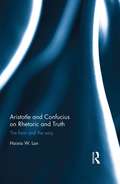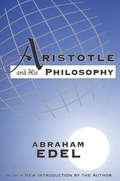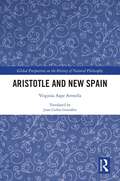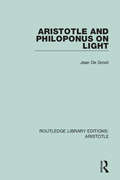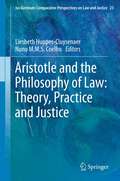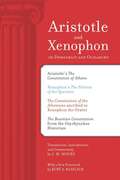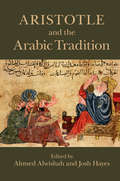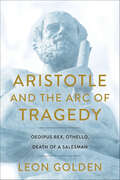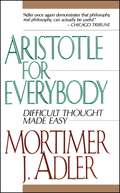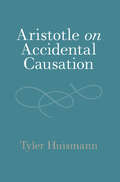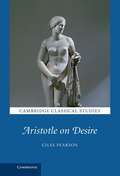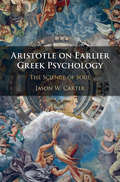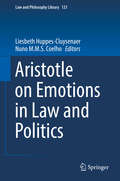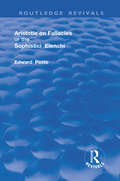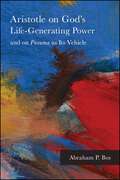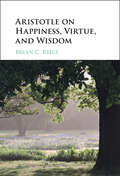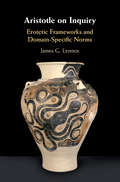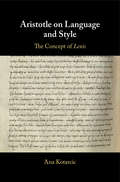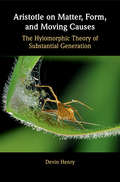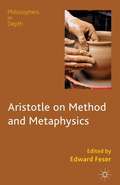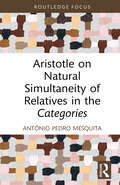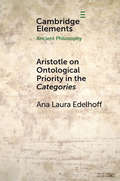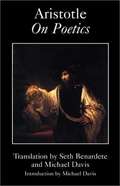- Table View
- List View
Aristotle and Confucius on Rhetoric and Truth: The Form and the Way
by Haixia LanThe current study argues that different cultures can coexist better today if we focus not only on what separates them but also on what connects them. To do so, the author discusses how both Aristotle and Confucius see rhetoric as a mode of thinking that is indispensable to the human understanding of the truths of things or dao-the-way, or, how both see the human understanding of the truths of things or dao-the-way as necessarily communal, open-ended, and discursive. Based on this similarity, the author aims to develop a more nuanced understanding of differences to help foster better cross-cultural communication. In making the argument, she critically examines two stereotyped views: that Aristotle’s concept of essence or truth is too static to be relevant to the rhetorical focus on the realm of human affairs and that Confucius’ concept of dao-the-way is too decentered to be compatible with the inferential/discursive thinking. In addition, the author relies primarily on the interpretations of the Analects by two 20th-century Chinese Confucians to supplement the overreliance on renderings of the Analects in recent comparative rhetorical scholarship. The study shows that we need an in-depth understanding of both the other and the self to comprehend the relation between the two.
Aristotle and His Philosophy
by Abraham EdelIn this stunning act of synthesis, Abraham Edel captures the entire range of Aristotle's thought in a manner that will prove attractive and convincing to a contemporary audience. Many philosophers approach Aristotle with their own, rather than his, questions. Some cast him as a partisan of a contemporary school. Even the neutral approach of classical scholarship often takes for granted questions that reflect our modern ways of dissecting the world.Aristotle and His Philosophy shows him at work in asking and answering questions. Abraham Edel fashions a sound comparative way of using current analysis to deepen our understanding of Aristotle rather than argue with or simply appropriate him. Edel examines how Aristotle's basic ideas operated in his scientific and humanistic works, what they enabled him to do, what they kept him from doing, and what in turn we can learn from his philosophical experimentation.The purpose of this volume is twofold: to provide a comprehensive introduction to Aristotle's thought, and to throw fresh light on its patterned and systematic character. First, tracing the pattern in Aristotle's metaphysical and physical writings, he then explores the psychology, epistemology, ethics and politics, rhetoric and poetics. In the process, Edel discusses the way interpretations of Aristotle are built up and how different philosophical outlooks Catholic, Hegelian, Marxian, linguistic, naturalistic, and pragmatic have affected the reading of Aristotelian texts and ideas.The new introduction probes the general problem of interpreting a philosophy, and suggests how working through the different interpretations can contribute to a fuller understanding. This methodological self-consciousness makes Aristotle and His Philosophy markedly different from other studies of Aristotle. Martha C. Nussbaum of Brown University has described Edel as having "philosophical sensitivity and good sense throughout. His scholarship is comprehensive, but handled with grace and clarity."
Aristotle and New Spain (Global Perspectives on the History of Natural Philosophy)
by Virginia Aspe ArmellaThis book is a detailed exploration of the Hispanic intellectual context and the different Aristotelian traditions that prevailed until the 16th century. Through a review and contextualisation of Aristotelian thinkers and texts, it argues that a unique Aristotelian tradition was formed in New Spain.The characteristic differences of Novohispanic Aristotelianism are a consequence of five factors: contact with the autochthonous cultures of America, the impact of the colonial organisation, the influence of the Salamanca humanist tradition, the presence of the Italian Aristotelianism of Renaissance translators in the university curricula and in the intellectual polemics of the time, and a peculiar assimilation of primitive and Old Testament Christianity in relation to indigenous people. This book analyses the works of Alonso de la Veracruz, Bartolomé de las Casas, Bernardino de Sahagún, Sor Juana Inés de la Cruz, Carlos de Sigüenza y Góngora, and Francisco Xavier Clavijero, reconsidering them in light of the history of ideas in New Spain and the contributions of Byzantine translators. It also offers a reflection on the problem of addressing Mexican colonial sources.This volume will be of interest to undergraduate and postgraduate philosophy students, as well as to researchers focused on Aristotle, Renaissance philosophy, or Latin American studies.
Aristotle and Philoponus on Light (Routledge Library Editions: Aristotle #3)
by Jean De GrootOriginally published in 1991. Philoponus’ long commentary on Aristotle’s definition of light sets up the major concerns, both in optics and theory of light, that are discussed here. Light was of special interest in Neoplatonism because of its being something incorporeal in the world of natural bodies. Light therefore had a special role in the philosophical analysis of the interpenetration of bodies and was also a paradigm for the soul-body problem. The book contains much about the physiology of vision as well as the propagation of light. Several chapters investigate the philosophical theory behind what came to be known as ‘multiplication of species’ in medieval light theory. These issues in the history of science are placed within an analysis of Neoplatonic development of the distinction between Aristotle’s kinesis and energeia. The book treats Philoponus’ philosophy of mathematical science from the point of view of matter, quantity, and three-dimensionality.
Aristotle and The Philosophy of Law: Theory, Practice And Justice (Ius Gentium: Comparative Perspectives on Law and Justice #23)
by Nuno M.M.S. Coelho Liesbeth Huppes-CluysenaerThe book presents a new focus on the legal philosophical texts of Aristotle, which offers a much richer frame for the understanding of practical thought, legal reasoning and political experience. It allows understanding how human beings interact in a complex world, and how extensive the complexity is which results from humans' own power of self-construction and autonomy. The Aristotelian approach recognizes the limits of rationality and the inevitable and constitutive contingency in Law. All this offers a helpful instrument to understand the changes globalisation imposes to legal experience today. The contributions in this collection do not merely pay attention to private virtues, but focus primarily on public virtues. They deal with the fact that law is dependent on political power and that a person can never be sure about the facts of a case or about the right way to act. They explore the assumption that a detailed knowledge of Aristotle's epistemology is necessary, because of the direct connection between Enlightened reasoning and legal positivism. They pay attention to the concept of proportionality, which can be seen as a precondition to discuss liberalism.
Aristotle and Xenophon On Democracy and Oligarchy
by J. M. MooreThis collection contains: Aristotle's "The Constitution of Athens"; Xenophon's "The Politeia of the Spartans"; "The Constitution of the Athenians" ascribed to Xenophon the Orator; and, "The Boeotian Constitution" from the Oxyrhynchus Historian. In bringing together, translating, and annotating these constitutional documents from ancient Greece thirty-five years ago, J.M. Moore produced an authoritative work of the highest scholarship. There is an explanatory essay by classics scholar Kurt A. Raaflaub that expands this indispensable collection.
Aristotle and the Arabic Tradition
by Ahmed Alwishah Josh HayesThis volume of essays by scholars in ancient Greek, medieval, and Arabic philosophy examines the full range of Aristotle's influence upon the Arabic tradition. It explores central themes from Aristotle's corpus, including logic, rhetoric and poetics, physics and meteorology, psychology, metaphysics, ethics and politics, and examines how these themes are investigated and developed by Arabic philosophers including al-Kindî, al-Fârâbî, Avicenna, al-Ghazâlî, Ibn Bâjja and Averroes. The volume also includes essays which explicitly focus upon the historical reception of Aristotle, from the time of the Greek and Syriac transmission of his texts into the Islamic world to the period of their integration and assimilation into Arabic philosophy. This rich and wide-ranging collection will appeal to all those who are interested in the themes, development and context of Aristotle's enduring legacy within the Arabic tradition.
Aristotle and the Arc of the Tragedy: Oedipus Rex, Othello, Death of a Salesman
by Leon GoldenAristotle and the Arc of Tragedy is the latest of Leon Golden’s books to connect Ancient Greece to modern culture. In a world facing many pressing issues Classics professor Golden wants to champion the values and achievements of Classical Civilization. He asserts that Homeric Epic and Greek Tragedy are as relevant today as they were millennia ago because they are riveting and insightful studies of the human condition. Their universality grants them a contemporary relevance despite the passage of time and changes in custom and taste.In one of his previous books, Understanding the Iliad, Golden illuminated the relevance of The Iliad for modern readers. The Bryn Mawr Classical Review praised Understanding the Iliad because it, “achieves what it sets out to accomplish: to provide an interpretation of the Iliad that emphasizes its didactic aspects, its ability to improve its readers by presenting the spectacle of the evolution of a flawed warrior consumed by destructive anger to a legitimate hero who transcends his narcissism and grandiosity and reaches out to others and by doing so heals his own aching soul in the process.”Golden, making use of correspondence and personal contact with Joseph Heller, himself, argues convincingly in Achilles and Yossarian that Homer’s The Iliad exerted a profound influence over Heller as he wrote his modern classic, Catch-22. A Kirkus review acclaims Achilles and Yossarian in these words: “Golden combines impressive erudition with a sharp critical eye and a lucid prose style that laymen will find accessible and engaging. The result is an original and persuasive work of literary scholarship that finds much more than mere war stories in these classics.”
Aristotle for Everybody
by Mortimer J. AdlerAristotle (384 - 322 B.C.) taught logic to Alexander the Great and, by virtue of his philosophical works, to every philosopher since, from Marcus Aurelius, to Thomas Aquinas, to Mortimer J. Adler. Now Adler instructs the world in the "uncommon common sense" of Aristotelian logic, presenting Aristotle's understandings in a current, delightfully lucid way. He brings Aristotle's work to an everyday level. By encouraging readers to think philosophically, Adler offers us a unique path to personal insights and understanding of intangibles, such as the difference between wants and needs, the proper way to pursue happiness, and the right plan for a good life.
Aristotle on Accidental Causation
by Tyler HuismannIn this major new study, Tyler Huismann connects Aristotle's natural philosophy to modern theories of causation and provides fresh interpretations of classic issues. He links two of the most important notions in Aristotle's philosophy, accidents and causes, and using the concept of accidental causation as a guide, argues for ground-breaking proposals on some of the most foundational areas of Aristotle's thought: the relation between substances and accidents, the nature of efficient causation, the workings of 'qua,' the possibility of uncaused events, and the role of accidental causation in the natural world. Structured around close readings of Aristotle's Physics and Metaphysics and informed by contemporary theories of causation, Huismann's book offers students an accessible treatment of some of Aristotle's core texts, and provides specialists with a series of provocative interpretations.
Aristotle on Desire
by Giles PearsonDesire is a central concept in Aristotle's ethical and psychological works, but he does not provide us with a systematic treatment of the notion itself. This book reconstructs the account of desire latent in his various scattered remarks on the subject and analyses its role in his moral psychology. Topics include: the range of states that Aristotle counts as desires (orexeis); objects of desire (orekta) and the relation between desires and envisaging prospects; desire and the good; Aristotle's three species of desire: epithumia (pleasure-based desire), thumos (retaliatory desire) and boulêsis (good-based desire – in a narrower notion of 'good' than that which connects desire more generally to the good); Aristotle's division of desires into rational and non-rational; Aristotle and some current views on desire; and the role of desire in Aristotle's moral psychology. The book will be of relevance to anyone interested in Aristotle's ethics or psychology.
Aristotle on Earlier Greek Psychology: The Science of Soul
by Jason W. CarterThis volume is the first in English to provide a full, systematic investigation into Aristotle's criticisms of earlier Greek theories of the soul from the perspective of his theory of scientific explanation. Some interpreters of the De Anima have seen Aristotle's criticisms of Presocratic, Platonic, and other views about the soul as unfair or dialectical, but Jason W. Carter argues that Aristotle's criticisms are in fact a justified attempt to test the adequacy of earlier theories in terms of the theory of scientific knowledge he advances in the Posterior Analytics. Carter proposes a new interpretation of Aristotle's confrontations with earlier psychology, showing how his reception of other Greek philosophers shaped his own hylomorphic psychology and led him to adopt a novel dualist theory of the soul–body relation. His book will be important for students and scholars of Aristotle, ancient Greek psychology, and the history of the mind–body problem.
Aristotle on Emotions in Law and Politics (Law and Philosophy Library #121)
by Nuno M.M.S. Coelho Liesbeth Huppes-CluysenaerIn this book, experts from the fields of law and philosophy explore the works of Aristotle to illuminate the much-debated and fascinating relationship between emotions and justice.<P><P> Emotions matter in connection with democracy and equity – they are relevant to the judicial enforcement of rights, legal argumentation, and decision-making processes in legislative bodies and courts. The decisive role that emotions, feelings and passions play in these processes cannot be ignored – not even by those who believe that emotions have no legitimate place in the public sphere. A growing body of literature on these topics recognizes the seminal insights contributed by Aristotle. This book offers a comprehensive analysis of his thinking in this context, as well as proposals for inspiring dialogues between his works and those written by a selection of modern and contemporary thinkers. As such, the book offers a valuable resource for students of law, philosophy, rhetoric, politics, ethics and history, but also for readers interested in the ongoing debate about legal positivism and the relevance of emotions for legal and political life in today’s world. <P> Explains how Aristotle’s attention to the non-rational elements of cognition contributes to his realistic views on the rule of law, social cohesion, democracy and judgment.<P> Re-appraises Aristotle’s biological view on the continuity between human and animal life.<P> Shows the striking similarity between the views of contemporary neuro-scientists and Aristotle’s thoughts on emotion.<P> Examines many of Aristotle’s writings such as Nicomachean Ethics, Politics, Rhetoric and Metaphysics.<P> Presents the outcomes of several years of interdisciplinary collaboration between ancient philosophy scholars, legal theorists, political scientists and historians
Aristotle on Fallacies; or The Sophistici Elenchi (Routledge Revivals)
by Edward PosteFirst published in 1866, Aristotle on fallacies; or the Sophistici Elenchi, Poste explains Aristotles explanation of the nature of fallacies, if not satisfactory, seems to be as compete and intelligible as any that has since been offered.
Aristotle on God's Life-Generating Power and on Pneuma as Its Vehicle (SUNY series in Ancient Greek Philosophy)
by Abraham P. BosIn this deep rethinking of Aristotle's work, Abraham P. Bos argues that scholarship on Aristotle's philosophy has erred since antiquity in denying the connection between his theology and his doctrine of reproduction and life in the earthly sphere. Beginning with an analysis of God's role in the Aristotelian system, Bos explores how this relates to other elements of his philosophy, especially to his theory of reproduction. The argument he develops is that in talking about the cosmos, Aristotle rejected Plato's metaphor of artisanal production by a divine Demiurge in favor of a biotic metaphor based on the transmission of life in reproduction, in which pneuma—not breath as it is often interpreted but the life-bearing spirit in animals and plants—plays a key and sustaining role as the vital principle in all that lives. In making this case, he defends the authenticity of the treatises De Mundo and De Spiritu as Aristotle's, and demonstrates Aristotle's works as a unified system that sharply and comprehensively refutes Plato's, and in particular replaces Plato's doctrine of the soul with a theory in which the soul is clearly distinguished from the intellect.
Aristotle on Happiness, Virtue, and Wisdom
by Bryan C. ReeceAristotle thinks that happiness is an activity – it consists in doing something – rather than a feeling. It is the best activity of which humans are capable and is spread out over the course of a life. But what kind of activity is it? Some of his remarks indicate that it is a single best kind of activity, intellectual contemplation. Other evidence suggests that it is an overarching activity that has various virtuous activities, ethical and intellectual, as parts. Numerous interpreters have sharply disagreed about Aristotle's answers to such questions. In this book, Bryan Reece offers a fundamentally new approach to determining what kind of activity Aristotle thinks happiness is, one that challenges widespread assumptions that have until now prevented a dialectically satisfactory interpretation. His approach displays the boldness and systematicity of Aristotle's practical philosophy.
Aristotle on Homonymy
by Julie K. WardJulie K. Ward examines Aristotle's thought regarding how language informs our views of what is real. First she places Aristotle's theory in its historical and philosophical contexts in relation to Plato and Speusippus. Ward then explores Aristotle's theory of language as it is deployed in several works, including Ethics, Topics, Physics, and Metaphysics, so as to consider its relation to dialectical practice and scientific explanation as Aristotle conceived it.
Aristotle on Inquiry: Erotetic Frameworks and Domain-Specific Norms
by James G. LennoxAristotle is a rarity in the history of philosophy and science - he is a towering figure in the history of both disciplines. Moreover, he devoted a great deal of philosophical attention to the nature of scientific knowledge. How then do his philosophical reflections on scientific knowledge impact his actual scientific inquiries? In this book James Lennox sets out to answer this question. He argues that Aristotle has a richly normative view of scientific inquiry, and that those norms are of two kinds: a general, question-guided framework applicable to all scientific inquiries, and domain-specific norms reflecting differences in the target of inquiry and in the means of observation available to researchers. To see these norms of inquiry in action, the second half of this book examines Aristotle's investigations of animals, the soul, material compounds, the motions of heavenly bodies, and respiration.
Aristotle on Language and Style: The Concept of Lexis
by Ana KotarcicThis is the first systematic analysis of Aristotle's concept of lexis. Ana Kotarcic argues that it should be approached on three interconnected levels: the first dealing with language as a system, the second with actual language usage, into which sociolinguistic factors come into play, and the third with prescriptions for the kind of language to be used in poetic and rhetorical compositions. She introduces ideas and concepts from classics and modern linguistics into the analysis alongside the philosophical approaches which have prevailed until now. The results reveal that Aristotle's ideas on lexis are complex, well-developed and intimately connected to many other fundamental concepts in his works, such as aretē, energeia, ēthos, logos, mimēsis, pathos, phantasia and technē. A major component of his thought is therefore illuminated comprehensively for the first time.
Aristotle on Matter, Form, and Moving Causes: The Hylomorphic Theory of Substantial Generation
by Devin HenryThis book examines an important area of Aristotle's philosophy: the generation of substances. While other changes presuppose the existence of a substance (Socrates grows taller), substantial generation results in something genuinely new that did not exist before (Socrates himself). The central argument of this book is that Aristotle defends a 'hylomorphic' model of substantial generation. In its most complete formulation, this model says that substantial generation involves three principles: (1) matter, which is the subject from which the change proceeds; (2) form, which is the end towards which the process advances; and (3) an efficient cause, which directs the process towards that form. By examining the development of this model across Aristotle's works, Devin Henry seeks to deepen our grasp on how the doctrine of hylomorphism - understood as a blueprint for thinking about the world - informs our understanding of the process by which new substances come into being.
Aristotle on Method and Metaphysics
by Edward FeserAristotle on Method and Metaphysics is a collection of new and cutting-edge essays by prominent Aristotle scholars and Aristotelian philosophers on themes in ontology, causation, modality, essentialism, the metaphysics of life, natural theology, and scientific and philosophical methodology.
Aristotle on Natural Simultaneity of Relatives in the Categories (Routledge Focus on Philosophy)
by António Pedro MesquitaThis book addresses the issue of natural simultaneity of relatives, discussed by Aristotle in Categories 7, 7b15– 8a12. Natural simultaneity is a form of symmetrical ontological dependence that holds between items that are not causally linked. In this section of the Categories, Aristotle introduces this topic in his analysis of relatives and maintains that although relatives seem to be for the most part simultaneous by nature, there seem to be some exceptions. He mentions two pairs of relatives as exceptions, namely the pairs knowledge/knowable and perception/perceptible, and argues at length for the priority of the second relative over the first one in each case. Through a close reading of this text, the author analyses Aristotle’s arguments for the thesis of the exceptional character of these pairs and shows that all of them are unsuccessful in supporting the thesis. In order to draw this conclusion, the author highlights and carefully considers the properties that Aristotle is committed to attributing to relatives, taking into account the metaphysical framework of the Categories as well as their specificities within the set of nonsubstantial categories. Then, he shows that Aristotle’s mature views on relatives in the Metaphysics can be construed as committing him to the rejection of such a thesis.Although the issue of natural simultaneity is just one of several that Aristotle considers in his discussion of relatives throughout Categories 7, it is a particularly relevant issue, since it involves a number of puzzles whose analysis allows for a better understanding of the very notion of relativity in Aristotle. This is the first book to explore this issue from the perspective of illuminating the Aristotelian views on relatives.Aristotle on Natural Simultaneity of Relatives in the Categories will appeal to scholars and graduate students working on Aristotle, ancient philosophy in general, and metaphysics.
Aristotle on Ontological Priority in the Categories (Elements in Ancient Philosophy)
by Ana Laura EdelhoffThe main objective of this Element is to reconstruct Aristotle's view on the nature of ontological priority in the Categories. Over the last three decades, investigations into ontological dependence and priority have become a major concern in contemporary metaphysics. Many see Aristotle as the originator of these discussions and, as a consequence, there is considerable interest in his own account of ontological dependence. In light of the renewed interest in Aristotelian metaphysics, it will be worthwhile - both historically and systematically - to return to Aristotle himself and to see how he himself conceived of ontological priority (what he calls 'priority in substance' [proteron kata ousian] or 'priority in nature' [proteron tēi phusei]), which is to be understood as a form of asymmetric ontological dependence.
Aristotle on Poetics
by Aristotle Seth Benardete Michael DavisAristotle's much-translated On Poetics is the earliest and arguably the best treatment that we possess of tragedy as a literary form. The late Seth Benardete and Michael Davis have translated it anew with a view to rendering Aristotle's text into English as precisely as possible. A literal translation has long been needed, for in order to excavate the argument of On Poetics one has to attend not simply to what is said on the surface but also to the various puzzles, questions, and peculiarities that emerge only on the level of how Aristotle says what he says and thereby leads one to revise and deepen one's initial understanding of the intent of the argument. As On Poetics is about how tragedy ought to be composed, it should not be surprising that it turns out to be a rather artful piece of literature in its own right.
Aristotle on Political Community
by David J. RiesbeckAristotle's claims that 'man is a political animal' and that political community 'exists for the sake of living well' have frequently been celebrated by thinkers of divergent political persuasions. The details of his political philosophy, however, have often been regarded as outmoded, contradictory, or pernicious. This book takes on the major problems that arise in attempting to understand how the central pieces of Aristotle's political thought fit together: can a conception of politics that seems fundamentally inclusive and egalitarian be reconciled with a vision of justice that seems uncompromisingly hierarchical and authoritarian? Riesbeck argues that Aristotle's ideas about the distinctive nature and value of political community, political authority, and political participation are coherent and consistent with his aristocratic standards of justice. The result is a theory that, while not free of problems, remains a potentially fruitful resource for contemporary thinking about the persistent problems of political life.
